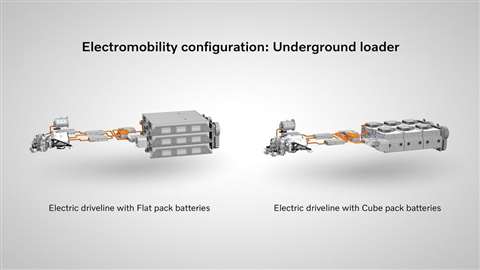Volvo Penta launches new cube battery
26 October 2022
Design to offer industrial customers increased installation flexibility, energy density
 Volvo Penta said its new cube battery offers industrial customers increased installation flexibility and a 40% increase in energy density. (Illustration: Volvo Penta)
Volvo Penta said its new cube battery offers industrial customers increased installation flexibility and a 40% increase in energy density. (Illustration: Volvo Penta)
Volvo Penta said its new cube battery is based on proven Volvo Group technology. Shown for the first time at Bauma in Munich, Germany, the company said the cube-shaped battery increases the versatility and flexibility of its electromobility offering, opening up electrification opportunities for more customers across a wider range of industrial subsectors, machines and applications.
The company’s cube battery and its existing flat-pack battery – which went into production in 2021 – offer customers reliable power and range with a 40% increase in energy density compared to what was previously available, allowing equipment to work for longer before a re-charge is needed.
Measuring 768x684x668 mm and boasting a lighter design, the cube battery delivers 90 kWh of energy, while the updated flat-pack battery delivers 94 kWh of energy.
“The new cubic battery shape is a strong addition to Volvo Penta’s electric driveline offering,” said Eduardo Araujo, electromobility product manager at Volvo Penta. “It has been developed to meet the needs of demanding applications and safety requirements, as well as facilitate alternative packaging designs due to its cubic shape – which allows the batteries to be easily stacked. It delivers increased energy density together with installation flexibility and will help OEMs transition to battery-electric power who maybe aren’t able to incorporate the length of the flat-pack design into their equipment.”
Proven Volvo Group technology
The cube battery is proven technology that is already being used in Volvo Trucks and benefits from hundreds of thousands of hours of testing and real-world use. As with the flat-pack battery, Volvo Penta said it will further develop and adapt the Volvo Group’s proven electric platform and combine it with its extensive knowledge and experience of the different applications, environments and climates its customers operate in.
“We take a full system supplier approach which means that we can create a flexible, bespoke electric driveline solution for specific machines and applications,” said Eduardo. “We are very experienced in a variety of different segments, so by using that knowledge and combining it with the Volvo Group’s proven electromobility experience, we can build the best modular system for our customer’s applications. We partner with our customers and collaborate to optimize the design and adapt the complete electric driveline system for a specific vehicle, allowing us to deliver a tailored solution based on their exact usage requirements.”
Volvo Penta said its partnership approach is what led to the series production of electric drivelines with fire truck manufacturer Rosenbauer and terminal tractor manufacturer TICO.
“The success of our electromobility partnerships has attracted increased interest and acceleration with customers in different industrial segments,” said Eduardo. “We have new projects in the pipeline that will begin in 2023.”
The company said its new battery offering is another step toward helping customers transition to net-zero emissions and achieving the company’s commitment to the Science Based Targets initiative (SBTi), where it aims to reach net-zero value chain emissions by 2040.

